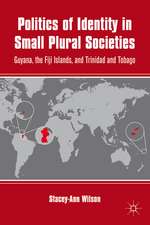Political and Religious Identities of British Evangelicals
Autor Andrea C. Hatcheren Limba Engleză Hardback – 28 iul 2017
| Toate formatele și edițiile | Preț | Express |
|---|---|---|
| Paperback (1) | 791.71 lei 38-45 zile | |
| Springer International Publishing – 2 aug 2018 | 791.71 lei 38-45 zile | |
| Hardback (1) | 950.03 lei 6-8 săpt. | |
| Springer International Publishing – 28 iul 2017 | 950.03 lei 6-8 săpt. |
Preț: 950.03 lei
Preț vechi: 1158.57 lei
-18% Nou
Puncte Express: 1425
Preț estimativ în valută:
181.79€ • 194.39$ • 151.57£
181.79€ • 194.39$ • 151.57£
Carte tipărită la comandă
Livrare economică 18 aprilie-02 mai
Preluare comenzi: 021 569.72.76
Specificații
ISBN-13: 9783319562810
ISBN-10: 3319562819
Pagini: 249
Ilustrații: XIII, 249 p. 6 illus. in color.
Dimensiuni: 148 x 210 mm
Greutate: 0.58 kg
Ediția:1st ed. 2017
Editura: Springer International Publishing
Colecția Palgrave Macmillan
Locul publicării:Cham, Switzerland
ISBN-10: 3319562819
Pagini: 249
Ilustrații: XIII, 249 p. 6 illus. in color.
Dimensiuni: 148 x 210 mm
Greutate: 0.58 kg
Ediția:1st ed. 2017
Editura: Springer International Publishing
Colecția Palgrave Macmillan
Locul publicării:Cham, Switzerland
Cuprins
1. The Same, But Different.-2. A View From the Top.-3. Religious and Political Identities.-4. Political Engagement.-5. Cultural Engagement.-6. Toward an Evangelical Identity.
Notă biografică
Andrea C. Hatcher is Associate Professor of Politics at The University of the South, USA
Textul de pe ultima copertă
This book examines the paradoxical relationship between the religious and political behaviors of American and British Evangelicals, who exhibit nearly identical religious canon and practice, but sharply divergent political beliefs and action. Relying on interviews with British religious and political elites (journalists, MPs, activists, clergy) as well as focus groups in ten Evangelical congregations, this study reveals that British Evangelicals, unlike their American counterparts known for their extensive involvement in party politics, have no discernible ideological or partisan orientation, choosing to pursue their political interests through civic or social organizations rather than electoral influence. It goes further to show that many British Evangelicals shun the label itself for its negative political connotations and in-/out-group sensibility, and choose to focus on a broader social justice imperative rendered almost incoherent by a lack of group identity. Placing itself at theforefront of an incipient but growing segment of comparative research into the intersectionality of religion and politics, the work satisfies a lacuna of how the same religious tradition can act differently in public squares contextualized by political and cultural variables.
Caracteristici
Provides the first in-depth academic study of British Evangelicals in a cross-national context, contrasting with the US Reveals that British Evangelicals have a focus on social justice issues which does not orient them to any particular political party or ideology Reveals a sensitivity to cultural pluralism but concern for social integration that presages the Brexit vote Includes supplementary material: sn.pub/extras












